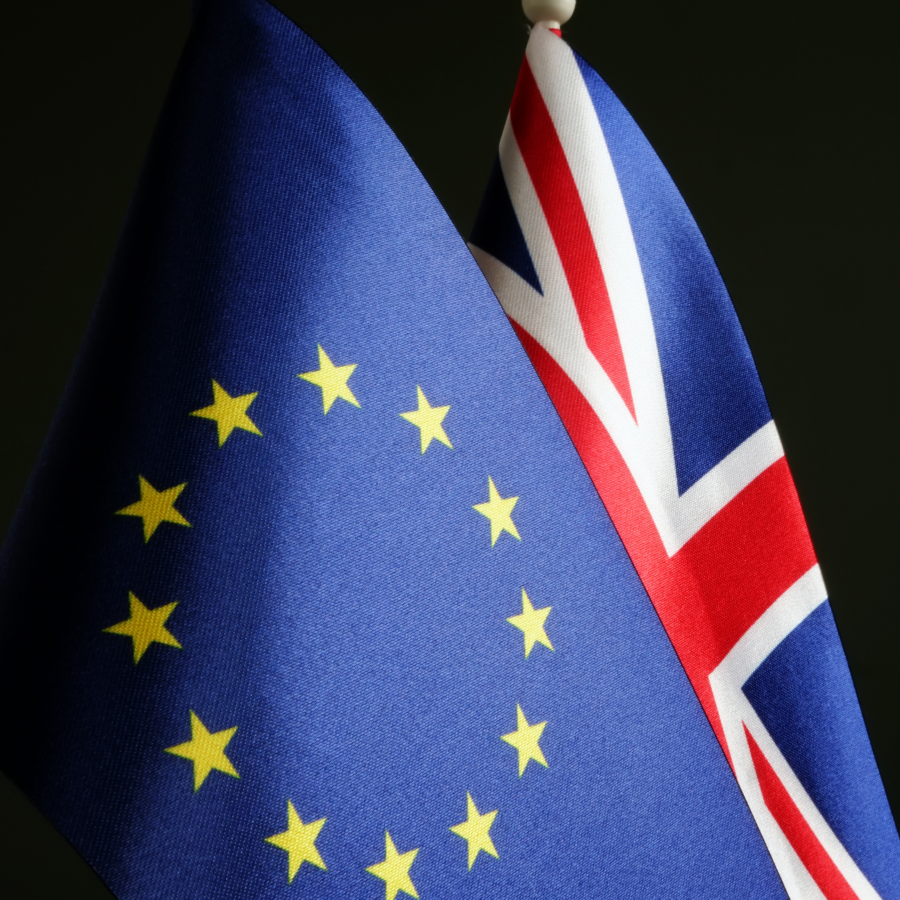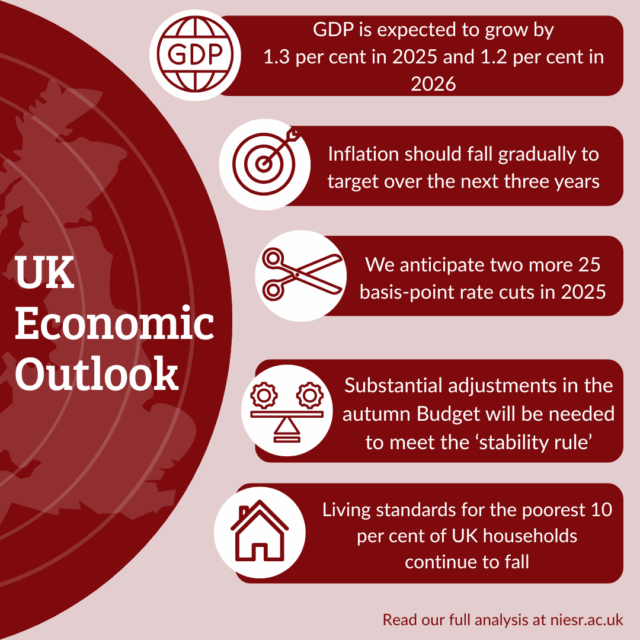Five Years On: The Economic Impact of Brexit
On 31 January 2020, the United Kingdom became the first member state to leave the European Union. In the five years since, what impact has Brexit-related uncertainty had on UK investment and trade? And how has Brexit compared to other economic shocks? In this blog, Senior Economist Dr Benjamin Caswell asks Associate Economist Hailey Low about the post-Brexit evolution of the UK economy.

Five years have passed since the United Kingdom officially left the European Union. How has the UK economy evolved during this time in relation to the EU economy?
Global disruptions, such as the COVID-19 pandemic and the Russia-Ukraine war, have affected all economies. However, Brexit has created structural barriers that further complicate the UK’s economic challenges. In 2023, the UK remained the only G7 nation that had not recovered to its pre-pandemic level of GDP. Meanwhile, countries within the European Union benefited from healthy intra-EU trade and coordinated recovery efforts, such as the €750 billion NextGenerationEU fund.
A significant difference also emerges in business investment. Chronic underinvestment, worsened by Brexit-related uncertainty, has caused UK businesses to be hesitant in adopting new technologies and expanding capacity. For example, foreign direct investment (FDI) inflows dropped by 37 per cent between 2016 and 2022 as multinational companies relocated operations to the EU to preserve access to the single market.
Labour shortages have also strained the UK economy. Before Brexit, businesses could readily meet their labour needs through the EU’s integrated labour market. Since the end of the free movement of labour, critical sectors like agriculture, healthcare and hospitality have all encountered labour shortages, resulting in higher operating costs while limiting output. In contrast, EU economies were able to leverage their integrated labour markets to respond more flexibly to post-pandemic workforce challenges.
Brexit has also transformed the UK’s trade relationship with its largest trading partner, the EU. Customs checks, rules of origin requirements, and regulatory differences have raised costs and administrative burdens for UK exporters, reducing trade volumes. Sectors dependent on EU markets, such as manufacturing, food exports, and labour-intensive sectors, have been hit harder. Meanwhile, EU countries have maintained smooth trade operations, giving them a competitive advantage. The UK’s sluggish productivity growth, which has persisted since the 2008 financial crisis, stems partly from these issues. Brexit’s structural effects—trade frictions, reduced labour mobility, and low investment—have worsened this problem, causing the UK to trail the EU in productivity improvements.
What role has uncertainty played in the economic impact of Brexit, particularly on investment and trade?
Expectations about the future economic outlook significantly influence spending and investment decisions. The uncertainty caused by Brexit has notably shaped its economic impact, particularly concerning investment and trade.
The prolonged uncertainty over what precise form Brexit would take from the 2016 referendum through the 2020 Trade and Cooperation Agreement (TCA) and beyond has discouraged businesses from pursuing long-term projects and disrupted trade flows. Even after the finalisation of Brexit, concerns about regulatory divergence and trade barriers continue to influence business decisions, hindering investment and overall economic growth.
The Bank of England’s Decision Maker Panel (DMP) survey highlights this ongoing uncertainty. Since 2016, at least 30 per cent of firms have consistently identified Brexit as one of their top three concerns, peaking at 55 per cent in 2020. Even after the implementation of the TCA, firms remain cautious due to shifting regulatory requirements, potential market access restrictions, and trade frictions.
The Windsor Framework, implemented in October 2023, aimed to address specific trade issues related to Northern Ireland. It established ‘green lanes’ to simplify customs procedures for goods remaining within the UK and ‘red lanes’ for products entering the EU single market, thereby reducing administrative burdens and costs. However, while it enhanced trade efficiency for Northern Ireland, it did not resolve broader uncertainties about the UK’s long-term regulatory alignment and trade relationships with the EU. Key industries, such as automotive manufacturing and chemicals, continue to exercise caution regarding divergence risks, which limits their willingness to invest.
In conclusion, Brexit-induced uncertainty has hampered investment, constrained trade, and necessitated costly adjustments in supply chains. Although the Windsor Framework has alleviated some logistical challenges, it has left broader concerns unaddressed. To restore business confidence, policymakers must prioritise providing regulatory clarity and strengthening trade ties with the EU. Without targeted measures, uncertainty will persist, limiting the UK’s long-term economic potential.
How does Brexit compare to other economic shocks?
Economic shocks—including financial crises, pandemics, and external geopolitical conflicts—disrupt growth, trade, and investment. Unlike these events, Brexit represents a self-imposed change rather than a temporary economic disturbance. Brexit has permanently diminished trade efficiency in the UK by introducing customs checks, rules of origin requirements, and regulatory divergence from the EU. These barriers increase costs for both exporters and importers, weakening the UK’s international competitiveness.
Furthermore, Brexit has intensified the UK’s longstanding productivity issues that have persisted since the 2008 financial crisis. Brexit has imposed lasting structural constraints on productivity, such as trade inefficiencies that disrupt just-in-time supply chains, labour shortages caused by ending free movement, increased business costs, and diminished output. These factors lower investment and restrict capital accumulation. Unlike cyclical downturns, Brexit’s negative impact on productivity is enduring and structural.
Additionally, Brexit has produced effects akin to a negative supply-side shock by increasing business costs through elevated administrative burdens from non-tariff barriers like customs checks and dual regulatory compliance. These burdens also stem from heightened investment risk from uncertainties surrounding future trade and regulations. Investment in the UK has suffered as many businesses have deferred decisions due to uncertainty surrounding Brexit, and even after its resolution, concerns about regulatory divergence and trade barriers have continued to discourage foreign direct investment. An analysis conducted by NIESR colleagues, published in November 2023, suggested that UK business investment could have been about 12.4 per cent higher in 2023 if Brexit did not happen.























